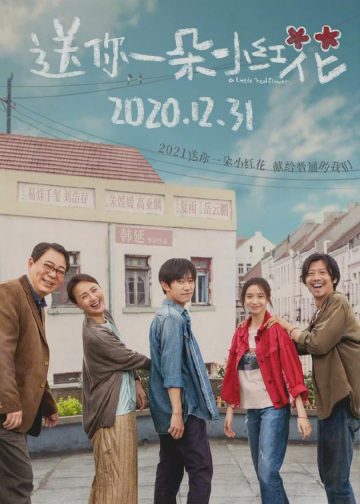
“Little Red Flower” is a teen romance movie filmed in China, directed by Han Yan. Narrated by the protagonist, Wei Yihang, this movie portrays the life of cancer patients and their family as they go through the onerous journey of fighting cancer. This movie was released at midnight on December 31, 2020, earning 7.61 hundred million RMB the first week of its release. Unlike previous movies revolving around the archetype of fighting cancer, which eventually leaves the audience with the echoing sadness from death, this movie highlights the importance of cherishing life and appreciating love.
The protagonist is played by actor Yiyangqianxi, also known as Jackson Yiyang, who is well-known for his excellent acting abilities, especially with teenage boy characters who are experiencing coming of age. In this film, he perfects his role as a rebellious cancer patient who is pessimistic about everything at first but learns to love as he interacts with his crush, Xiaoyuan.
Yihang was never optimistic; he expected death and never had expectations—whether on himself or those around him. He sat in the corners of buses and liked to walk leaning towards the walls on sidewalks. He rarely ever has his head upfront, almost always facing downwards. Unlike his patient-friends, who Yihang forcibly made friends with after his parents practically begging him to, Yihang never expected to live longer than an average person, despite being clinical “fully cured.”
Ma Xiaoyuan, on the other hand, is a girl who has diagnosed with cancer at the age of five. She knew her life would be difficult since the very beginning of her childhood, especially as her mother passed away while she was still young. However, she never focused on the fact she might die unexpectedly one day. She always took care of people, nurtured the younger children, and protected the elderly. She was the polar opposite of Yihang, who believed in a parallel universe, where no one had cancer; especially not her nor Yihang.
It all starts when Xiaoyuan draws a little red flower on Yihang’s hand.
In Chinese kindergartens and elementary schools, teachers will give out little red flowers to students who behave well; Yihang never received one. After hearing this rather unfortunate life-story, Xiaoyuan decides to draw one on Yihang’s hand, as a prize for confessing his love for the first time.
The two teenagers eventually fall in love, with Xiaoyuan influencing Yihang more and more as the days pass. Despite the two knowing that death is inevitable, and will approach them earlier than it will to an average person, they focused on the fact that they loved each other and decided to adore every moment they had together.
When they finally go on a trip to the place that continuously appeared in Yihang’s allusions, Xiaoyuan passes out, stopping both the trip and the two’s interaction, temporarily. It was the first time in the entire movie where Xiaoyuan was emotionally extreme, insensitive, and pessimistic. It was exactly this moment and scene where the director successfully delivers the message on the importance of living in the moment, as death is unavoidable, even in the most idealistic and fictional settings.
This movie has countless tear-points. Not simply because this movie has countless deaths of cancer patients, but because of the realistic and relatable setting, that is not special or unique to cancer patient families. There is often a stereotype regarding families with cancer patients; they are optimistic and usually less privileged than an average, middle-class family due to medical bills. While this movie and Yihang’s family is a perfect example of this stereotype, the audience is often led to stray away from these conventions with the immense load of real-life details the movie depicts. Starting from the table that needs folded papers on the bottom of the legs to balance it because of its weariness from being used for over 10 years to his father shivering and shaking of nervousness and anxiety as he delivers Yihang’s medicines to Yihang as he runs away from his house—these details make this film a work phenomenal and different from the traditional sad stories.
In conclusion, would I recommend this movie? Definitely. It taught me personally several values. First, it highlighted the parents’ efforts to understand their children’s pain and emotions, despite being amateurs—and this acknowledgment is necessary. Second, life is short, and there are many things we will regret in the future—hence, refrain yourself from doing impulsive things that you know you will regret doing, or from thinking too much. Sometimes, impulsive actions will bring great outcomes. Last but not least, three, it taught me to be grateful for the figures around me. Always acknowledge their efforts and care. Always appreciate the help you receive.